高中英语专项复习 定语从句专项复习课件(19张PPT)
文档属性
| 名称 | 高中英语专项复习 定语从句专项复习课件(19张PPT) | 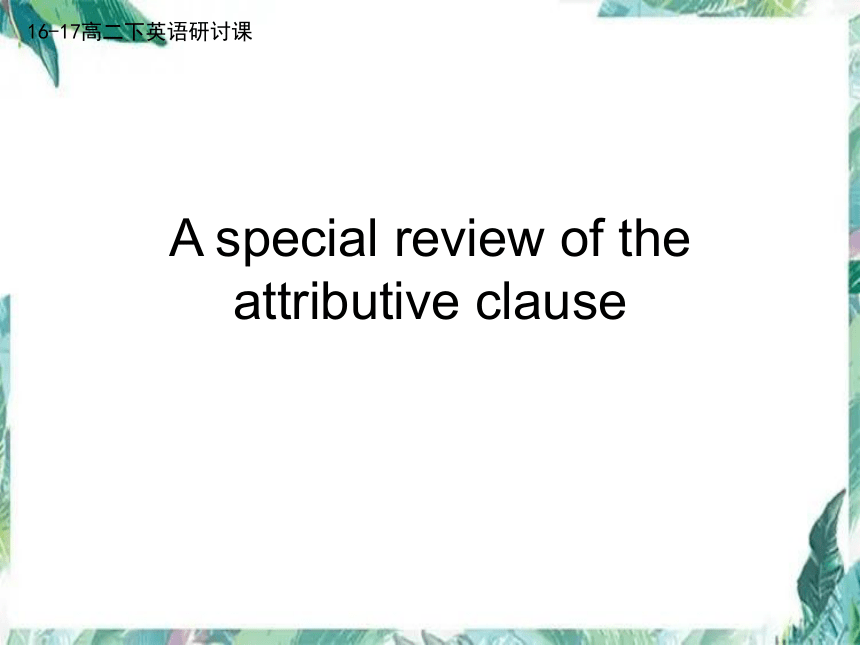 | |
| 格式 | zip | ||
| 文件大小 | 209.0KB | ||
| 资源类型 | 教案 | ||
| 版本资源 | 通用版 | ||
| 科目 | 英语 | ||
| 更新时间 | 2022-05-17 14:49:12 | ||
图片预览

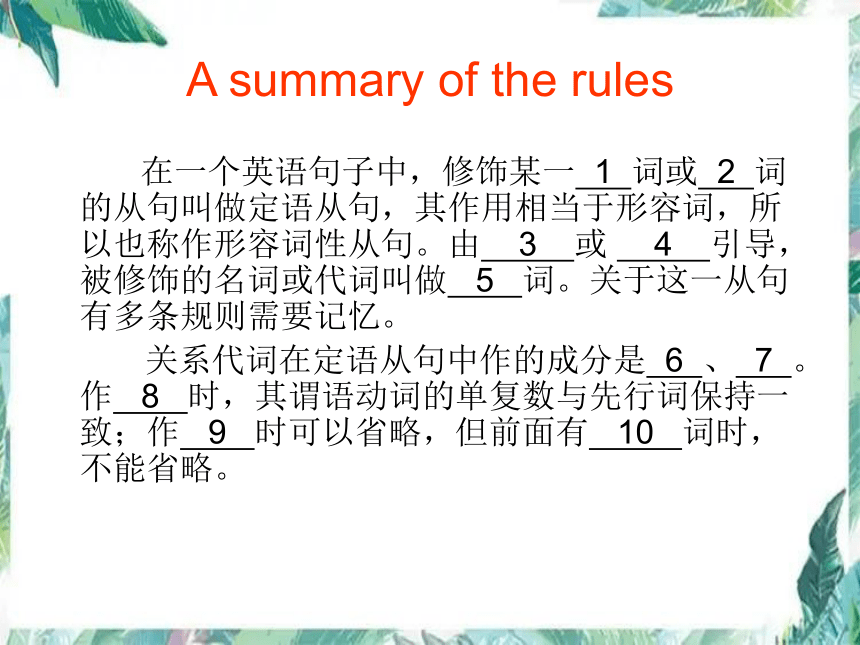
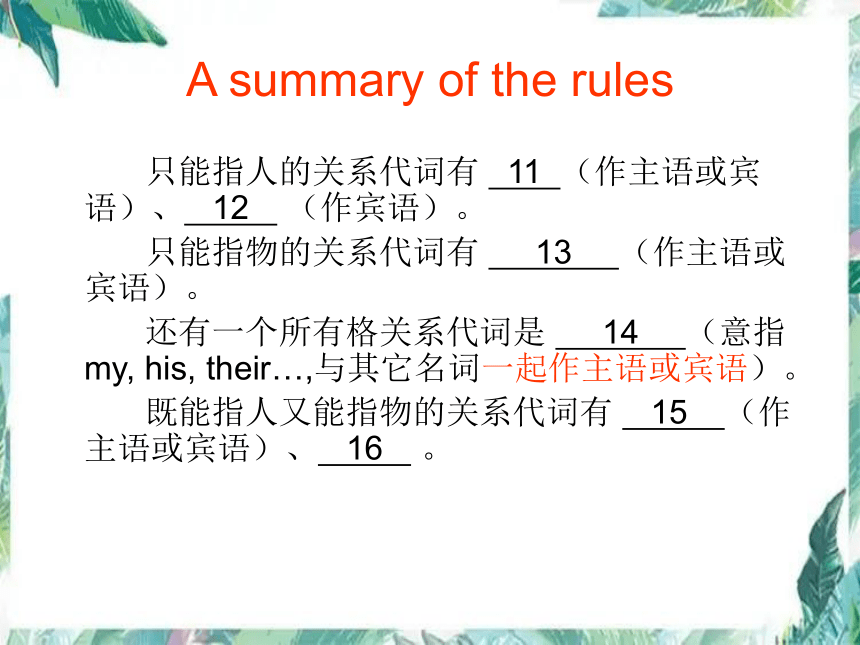
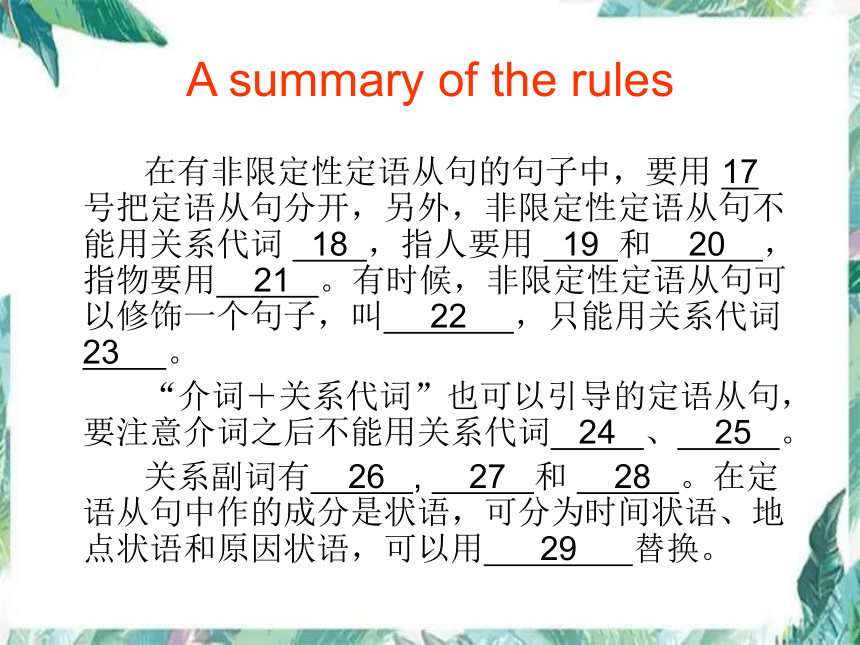
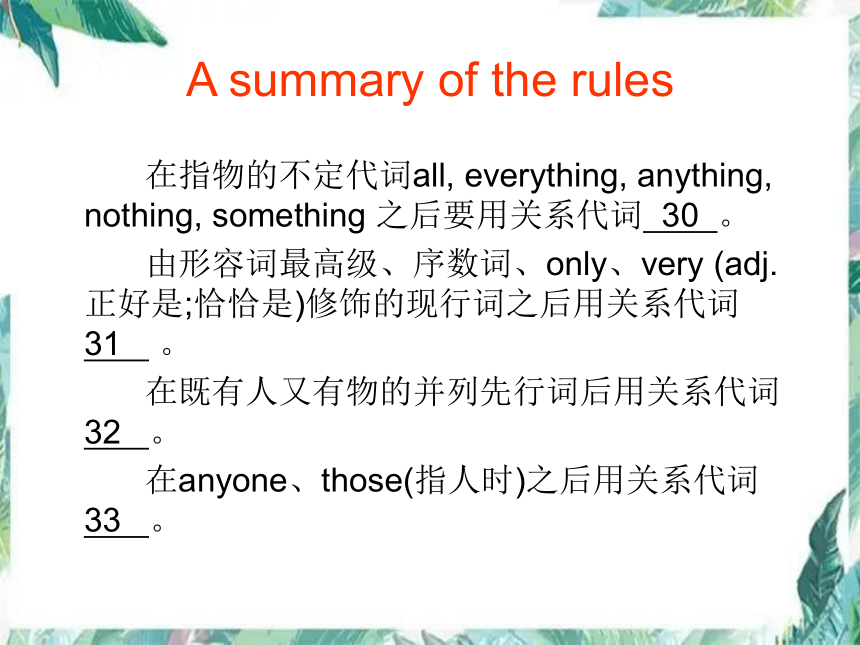
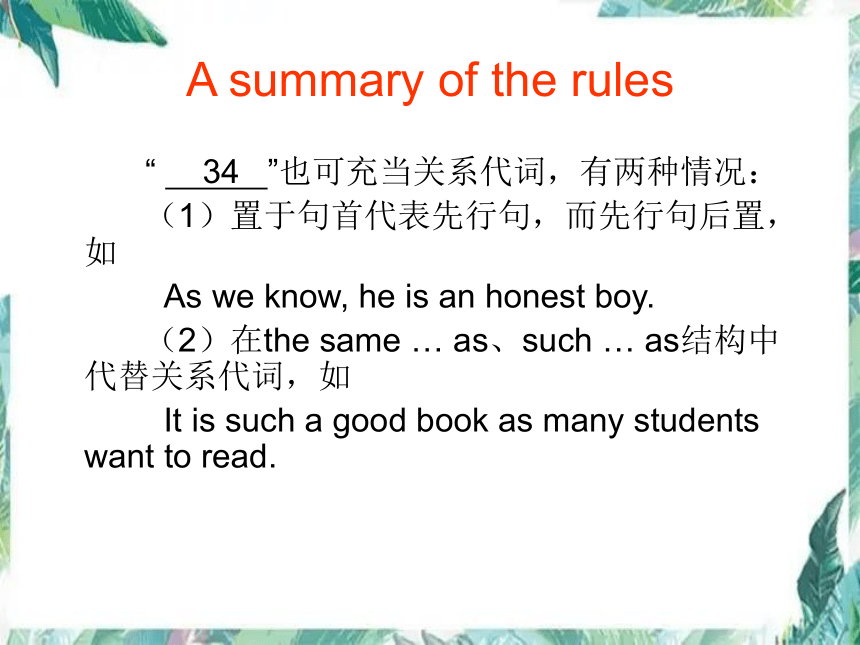
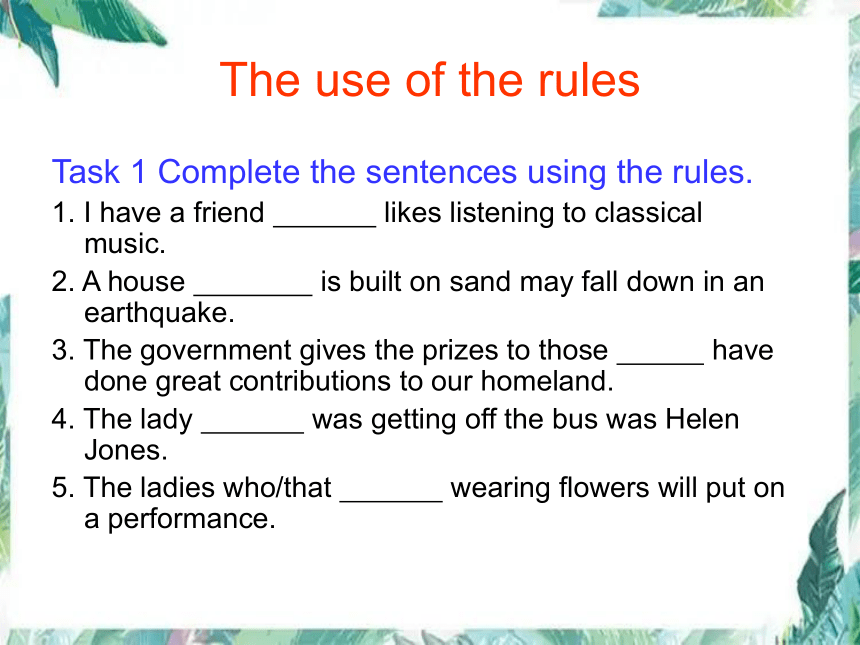
文档简介
(共19张PPT)
A special review of the attributive clause
16-17高二下英语研讨课
A summary of the rules
在一个英语句子中,修饰某一 1 词或 2 词的从句叫做定语从句,其作用相当于形容词,所以也称作形容词性从句。由 3 或 4 引导,被修饰的名词或代词叫做 5 词。关于这一从句有多条规则需要记忆。
关系代词在定语从句中作的成分是 6 、 7 。作 8 时,其谓语动词的单复数与先行词保持一致;作 9 时可以省略,但前面有 10 词时,不能省略。
A summary of the rules
只能指人的关系代词有 11 (作主语或宾语)、 12 (作宾语)。
只能指物的关系代词有 13 (作主语或宾语)。
还有一个所有格关系代词是 14 (意指my, his, their…,与其它名词一起作主语或宾语)。
既能指人又能指物的关系代词有 15 (作主语或宾语)、 16 。
A summary of the rules
在有非限定性定语从句的句子中,要用 17 号把定语从句分开,另外,非限定性定语从句不能用关系代词 18 ,指人要用 19 和 20 ,指物要用 21 。有时候,非限定性定语从句可以修饰一个句子,叫 22 ,只能用关系代词23 。
“介词+关系代词”也可以引导的定语从句,要注意介词之后不能用关系代词 24 、 25 。
关系副词有 26 , 27 和 28 。在定语从句中作的成分是状语,可分为时间状语、地点状语和原因状语,可以用 29 替换。
A summary of the rules
在指物的不定代词all, everything, anything, nothing, something 之后要用关系代词 30 。
由形容词最高级、序数词、only、very (adj.正好是;恰恰是)修饰的现行词之后用关系代词 31 。
在既有人又有物的并列先行词后用关系代词 32 。
在anyone、those(指人时)之后用关系代词 33 。
A summary of the rules
“ 34 ”也可充当关系代词,有两种情况:
(1)置于句首代表先行句,而先行句后置,如
As we know, he is an honest boy.
(2)在the same … as、such … as结构中代替关系代词,如
It is such a good book as many students want to read.
The use of the rules
Task 1 Complete the sentences using the rules.
1. I have a friend likes listening to classical music.
2. A house is built on sand may fall down in an earthquake.
3. The government gives the prizes to those have done great contributions to our homeland.
4. The lady was getting off the bus was Helen Jones.
5. The ladies who/that wearing flowers will put on a performance.
The use of the rules
Task 1 Complete the sentences using the rules.
6. The woman you met in my office is a scientist.
7. The room window broke in a storm used to be a meeting room.
8. The teacher son had graduated from Beijing University was asked to give a speech.
9. Yesterday Emily was wearing the new dress I gave her.
10. Betty, has never been abroad, is studying English very well.
The use of the rules
Task 1 Complete the sentences using the rules.
11. My brother, you met in Beijing, has bought a new car.
12. The Project Hope, started many years ago, has helped many children go to school.
13. He often sleeps in class, has made him fall behind others.
14. The boy with John spoke is my brother.
15. He bought many books which he spent almost all the money.
The use of the rules
Task 1 Complete the sentences using the rules.
16. The little creature the scientists are interested is known as ET.
17. Mr. Wang came here in a car, the doors of have fallen off.
18. I remember the day my father died. I was only ten years old at that time.
19. Yesterday we went to visit the house the great writer used to live.
20. There are several reasons we can’t do that.
The use of the rules
Task 1 Complete the sentences using the rules.
21. I think this is the very point must be
insisted on.
22. He finished the same work I did.
The use of the rules
Task 2 Join each pair of sentences using the rules.
1. I enjoy visiting places. The hotels are cheap there and people are friendly.
2. The person had to go home for a month. I was working with her.
3. That is a subject. I know very little about it.
4. Some people are usually interesting to talk to. Their lives are adventurous.
5. Do you remember the national park We were attacked by wild pigs there.
The use of the rules
Task 2 Join each pair of sentences using the rules.
6. My cousin studies the behaviour of animals. She likes singing and dancing.
7. A Brief History of Time was written by Stephen Hawking. The book is a best-seller.
8. The professor was Albert Einstein. She did research for him.
9. The kind of insect interests me most. It is the butterfly.
10. My mother still remembers the winter of 1976. A terrible earthquake happened then.
The use of the rules
Task 3 Correct the sentences using the rules.
1. Those that want to buy the dictionary may sign their
names here.
2. My brother, that you met in Beijing , has bought a new
car.
3. I realized that the day when I had been looking forward
to would never come.
4. The astronaut you want to see come.
The use of the rules
Task 3 Correct the sentences using the rules.
5. The girl studies music plays the violin very well.
6. Pass me the books which lies on the desk.
7. I don’t know the man my father just spoke.
8. Everything we saw it at the West Lake was moving.
9. He spoke of the workers and the factories which he had visited.
The use of the rules
Task 4 Define the words with the attributive clauses.
Example:
---What is a broom
---A broom is a big brush which has a long handle for sweeping.
…….
The use of the rules
Task 5 Translate the passage into English and each sentence should have an attributive clause.
我们的日常生活
我们在一所被称作兰大附中的高中学习。我们学习的教室在一幢雄伟的大楼里面。它是一间宽大敞亮的房间,窗户朝南。我们不喜欢周日,在这些天,我们每天来的太早,回家很晚。任何迟到者都要受到班主任的惩罚。白天我们要上10节课,晚饭后还要花4个多小时完成那么多作业,这让我们疲乏又瞌睡。我们过着如此辛苦生活的原因是我们必须要为我们的未来获得足够的知识。我们学的最重要课程是英语,但没有多的时间去学它,真是个遗憾。
The use of the rules
Task 5 The translation of the passage.
Our daily life
We study in a high school which is called Lanzhou University High School. The classroom where (in which) we study is in a grand building. It is a large and bright room whose windows face the south. We dislike the weekdays when (during which) we come too early and go home very late every day. Anyone who comes late will be punished by his head teacher. In the daytime we have 10 classes, and after supper we still have to spend over 4 hours finishing so much homework, which makes us very tired and sleepy. The reason why (for which) we lead so hard a hard life is that we must gain enough knowledge for our future. The most important subject that we learn is English, but we don’t have much time for it, which is a great pity.
Homework
Learn the rules of the attributive clauses by heart.
A special review of the attributive clause
16-17高二下英语研讨课
A summary of the rules
在一个英语句子中,修饰某一 1 词或 2 词的从句叫做定语从句,其作用相当于形容词,所以也称作形容词性从句。由 3 或 4 引导,被修饰的名词或代词叫做 5 词。关于这一从句有多条规则需要记忆。
关系代词在定语从句中作的成分是 6 、 7 。作 8 时,其谓语动词的单复数与先行词保持一致;作 9 时可以省略,但前面有 10 词时,不能省略。
A summary of the rules
只能指人的关系代词有 11 (作主语或宾语)、 12 (作宾语)。
只能指物的关系代词有 13 (作主语或宾语)。
还有一个所有格关系代词是 14 (意指my, his, their…,与其它名词一起作主语或宾语)。
既能指人又能指物的关系代词有 15 (作主语或宾语)、 16 。
A summary of the rules
在有非限定性定语从句的句子中,要用 17 号把定语从句分开,另外,非限定性定语从句不能用关系代词 18 ,指人要用 19 和 20 ,指物要用 21 。有时候,非限定性定语从句可以修饰一个句子,叫 22 ,只能用关系代词23 。
“介词+关系代词”也可以引导的定语从句,要注意介词之后不能用关系代词 24 、 25 。
关系副词有 26 , 27 和 28 。在定语从句中作的成分是状语,可分为时间状语、地点状语和原因状语,可以用 29 替换。
A summary of the rules
在指物的不定代词all, everything, anything, nothing, something 之后要用关系代词 30 。
由形容词最高级、序数词、only、very (adj.正好是;恰恰是)修饰的现行词之后用关系代词 31 。
在既有人又有物的并列先行词后用关系代词 32 。
在anyone、those(指人时)之后用关系代词 33 。
A summary of the rules
“ 34 ”也可充当关系代词,有两种情况:
(1)置于句首代表先行句,而先行句后置,如
As we know, he is an honest boy.
(2)在the same … as、such … as结构中代替关系代词,如
It is such a good book as many students want to read.
The use of the rules
Task 1 Complete the sentences using the rules.
1. I have a friend likes listening to classical music.
2. A house is built on sand may fall down in an earthquake.
3. The government gives the prizes to those have done great contributions to our homeland.
4. The lady was getting off the bus was Helen Jones.
5. The ladies who/that wearing flowers will put on a performance.
The use of the rules
Task 1 Complete the sentences using the rules.
6. The woman you met in my office is a scientist.
7. The room window broke in a storm used to be a meeting room.
8. The teacher son had graduated from Beijing University was asked to give a speech.
9. Yesterday Emily was wearing the new dress I gave her.
10. Betty, has never been abroad, is studying English very well.
The use of the rules
Task 1 Complete the sentences using the rules.
11. My brother, you met in Beijing, has bought a new car.
12. The Project Hope, started many years ago, has helped many children go to school.
13. He often sleeps in class, has made him fall behind others.
14. The boy with John spoke is my brother.
15. He bought many books which he spent almost all the money.
The use of the rules
Task 1 Complete the sentences using the rules.
16. The little creature the scientists are interested is known as ET.
17. Mr. Wang came here in a car, the doors of have fallen off.
18. I remember the day my father died. I was only ten years old at that time.
19. Yesterday we went to visit the house the great writer used to live.
20. There are several reasons we can’t do that.
The use of the rules
Task 1 Complete the sentences using the rules.
21. I think this is the very point must be
insisted on.
22. He finished the same work I did.
The use of the rules
Task 2 Join each pair of sentences using the rules.
1. I enjoy visiting places. The hotels are cheap there and people are friendly.
2. The person had to go home for a month. I was working with her.
3. That is a subject. I know very little about it.
4. Some people are usually interesting to talk to. Their lives are adventurous.
5. Do you remember the national park We were attacked by wild pigs there.
The use of the rules
Task 2 Join each pair of sentences using the rules.
6. My cousin studies the behaviour of animals. She likes singing and dancing.
7. A Brief History of Time was written by Stephen Hawking. The book is a best-seller.
8. The professor was Albert Einstein. She did research for him.
9. The kind of insect interests me most. It is the butterfly.
10. My mother still remembers the winter of 1976. A terrible earthquake happened then.
The use of the rules
Task 3 Correct the sentences using the rules.
1. Those that want to buy the dictionary may sign their
names here.
2. My brother, that you met in Beijing , has bought a new
car.
3. I realized that the day when I had been looking forward
to would never come.
4. The astronaut you want to see come.
The use of the rules
Task 3 Correct the sentences using the rules.
5. The girl studies music plays the violin very well.
6. Pass me the books which lies on the desk.
7. I don’t know the man my father just spoke.
8. Everything we saw it at the West Lake was moving.
9. He spoke of the workers and the factories which he had visited.
The use of the rules
Task 4 Define the words with the attributive clauses.
Example:
---What is a broom
---A broom is a big brush which has a long handle for sweeping.
…….
The use of the rules
Task 5 Translate the passage into English and each sentence should have an attributive clause.
我们的日常生活
我们在一所被称作兰大附中的高中学习。我们学习的教室在一幢雄伟的大楼里面。它是一间宽大敞亮的房间,窗户朝南。我们不喜欢周日,在这些天,我们每天来的太早,回家很晚。任何迟到者都要受到班主任的惩罚。白天我们要上10节课,晚饭后还要花4个多小时完成那么多作业,这让我们疲乏又瞌睡。我们过着如此辛苦生活的原因是我们必须要为我们的未来获得足够的知识。我们学的最重要课程是英语,但没有多的时间去学它,真是个遗憾。
The use of the rules
Task 5 The translation of the passage.
Our daily life
We study in a high school which is called Lanzhou University High School. The classroom where (in which) we study is in a grand building. It is a large and bright room whose windows face the south. We dislike the weekdays when (during which) we come too early and go home very late every day. Anyone who comes late will be punished by his head teacher. In the daytime we have 10 classes, and after supper we still have to spend over 4 hours finishing so much homework, which makes us very tired and sleepy. The reason why (for which) we lead so hard a hard life is that we must gain enough knowledge for our future. The most important subject that we learn is English, but we don’t have much time for it, which is a great pity.
Homework
Learn the rules of the attributive clauses by heart.
